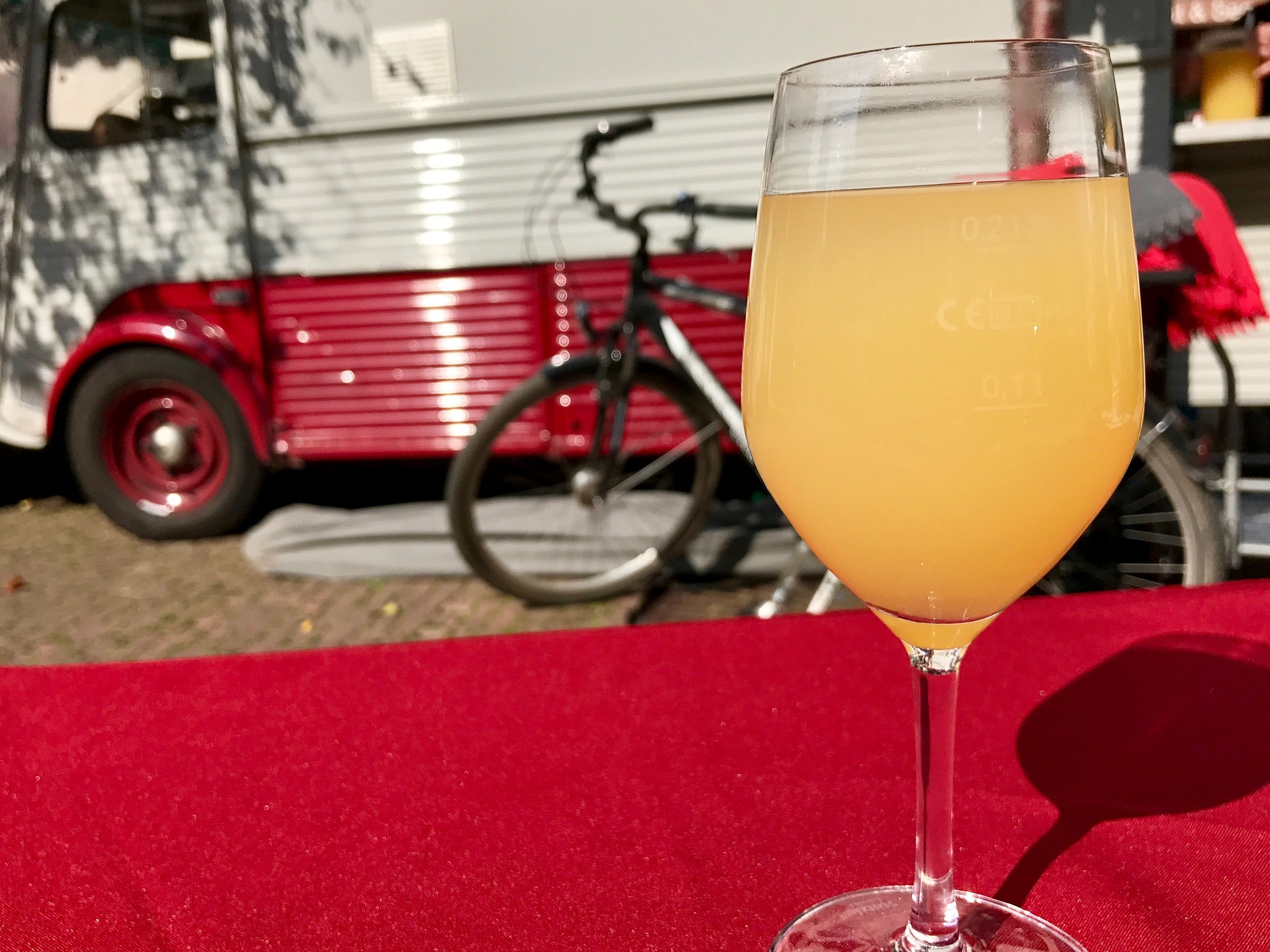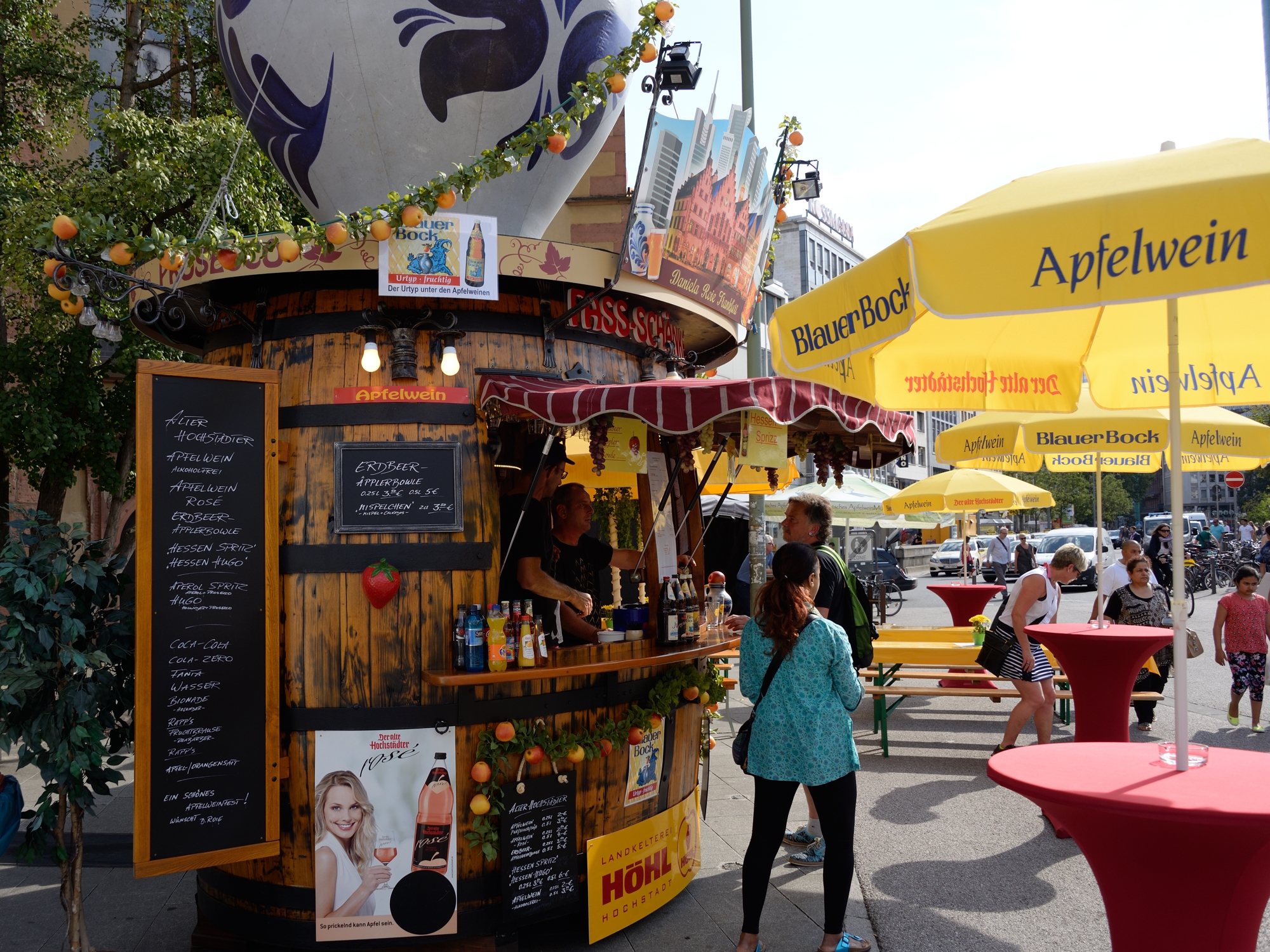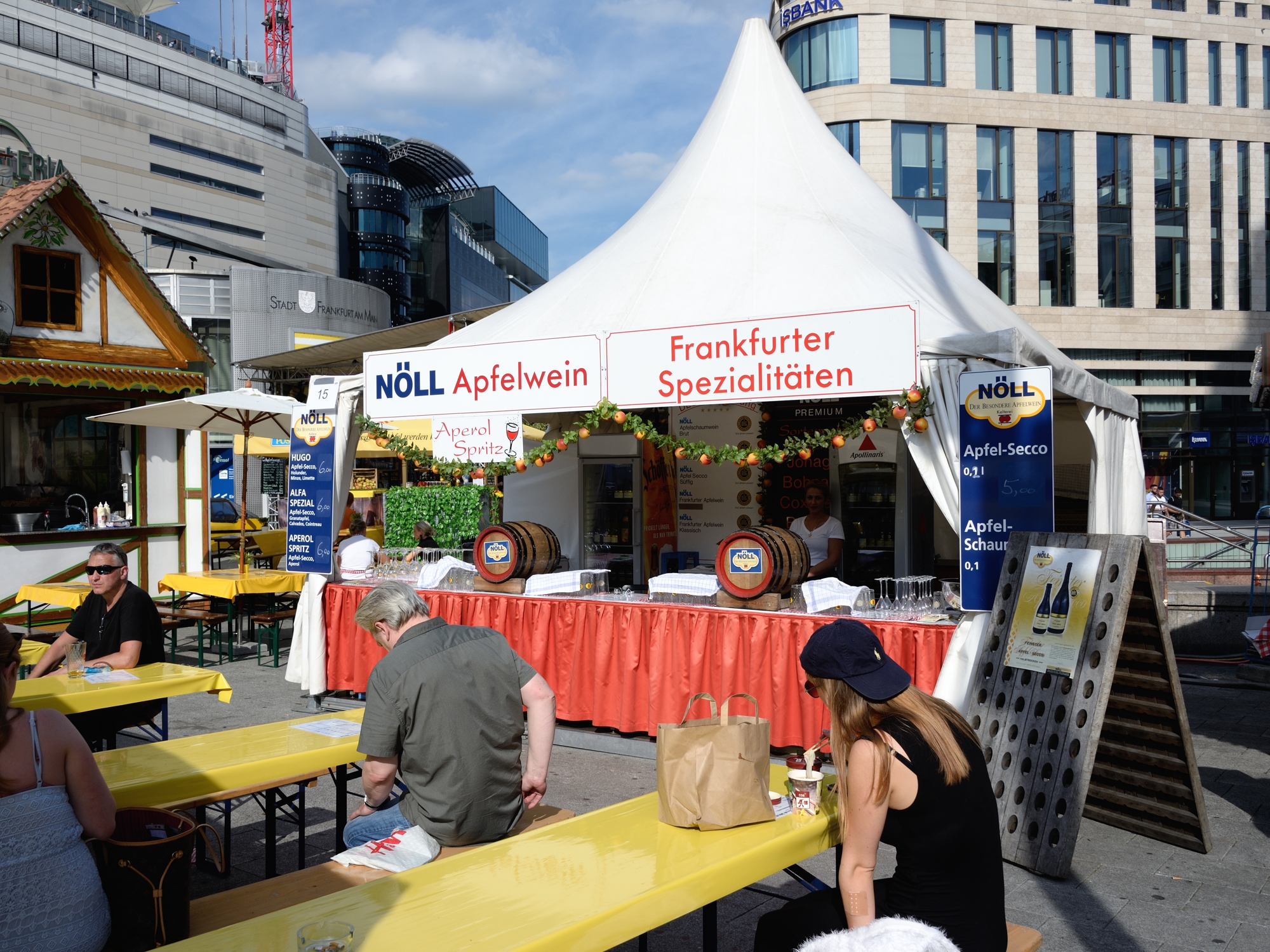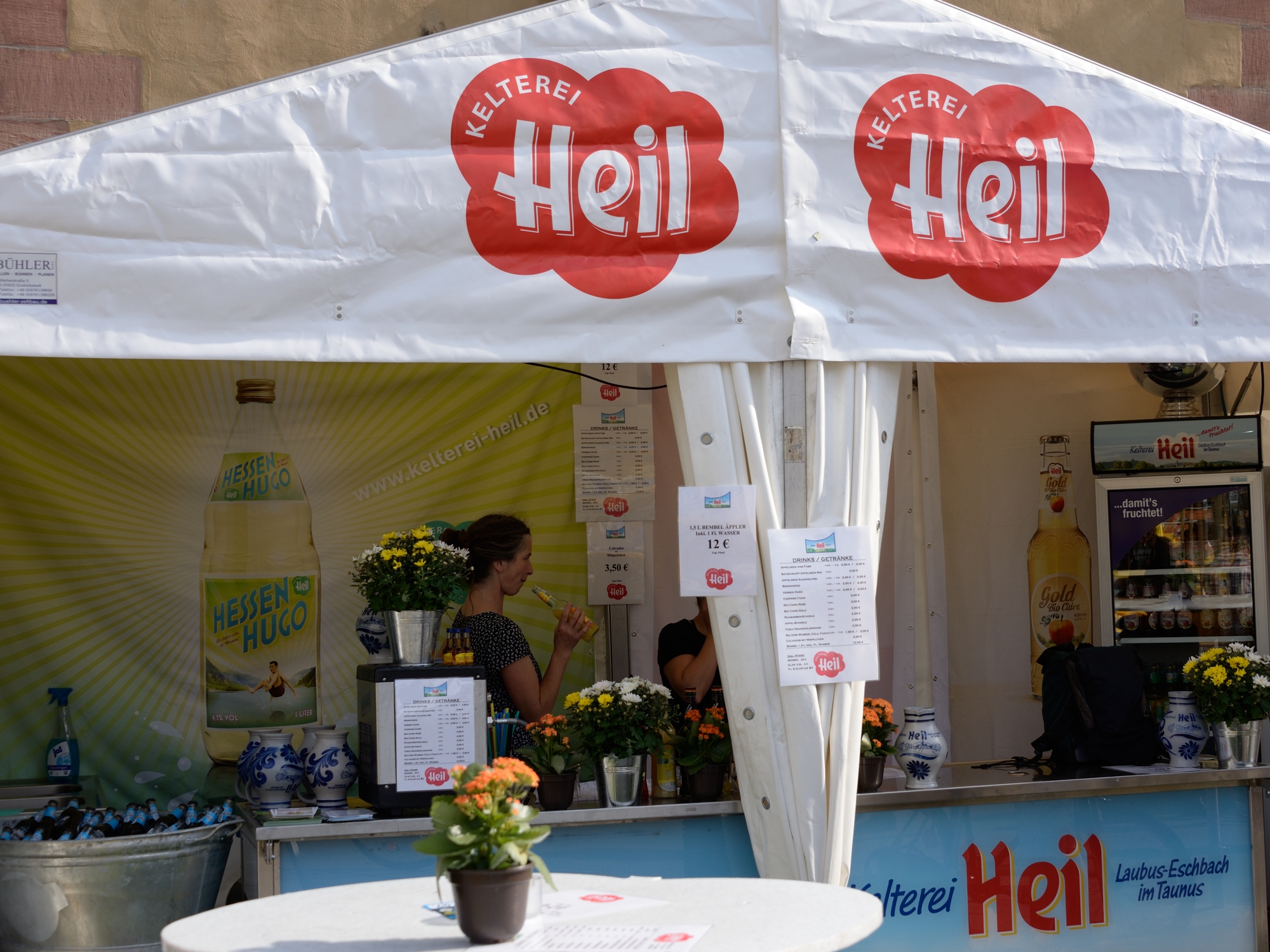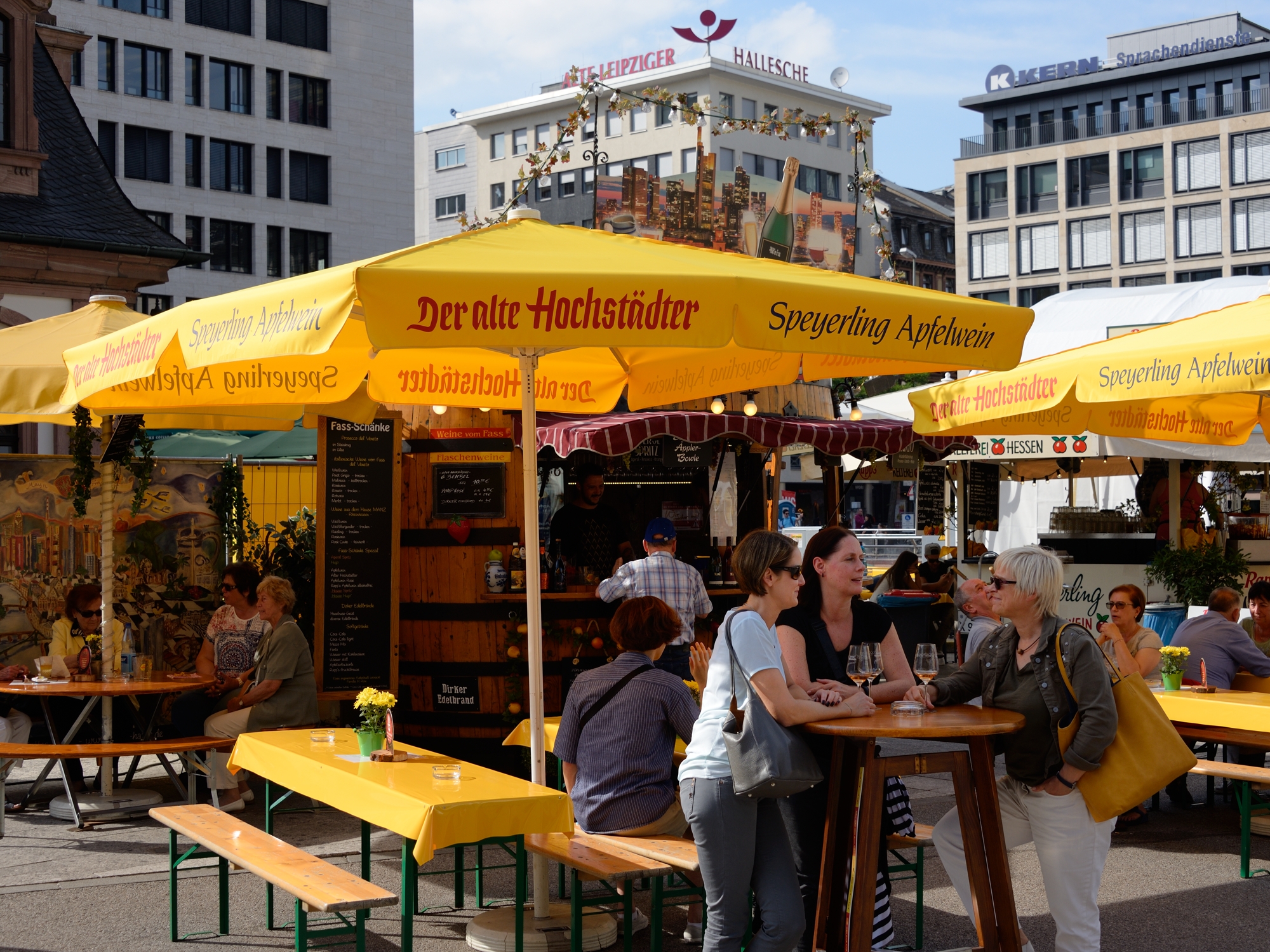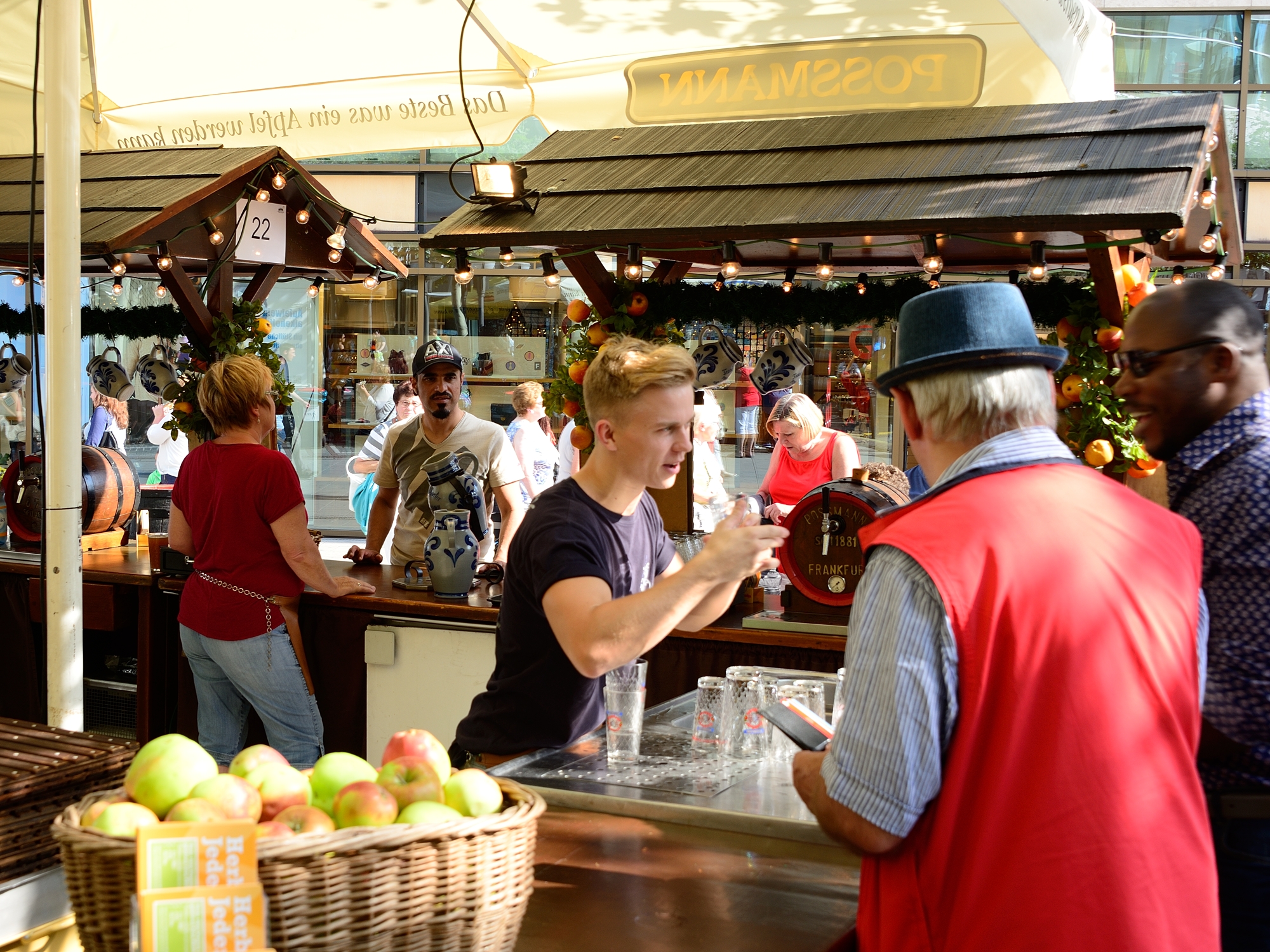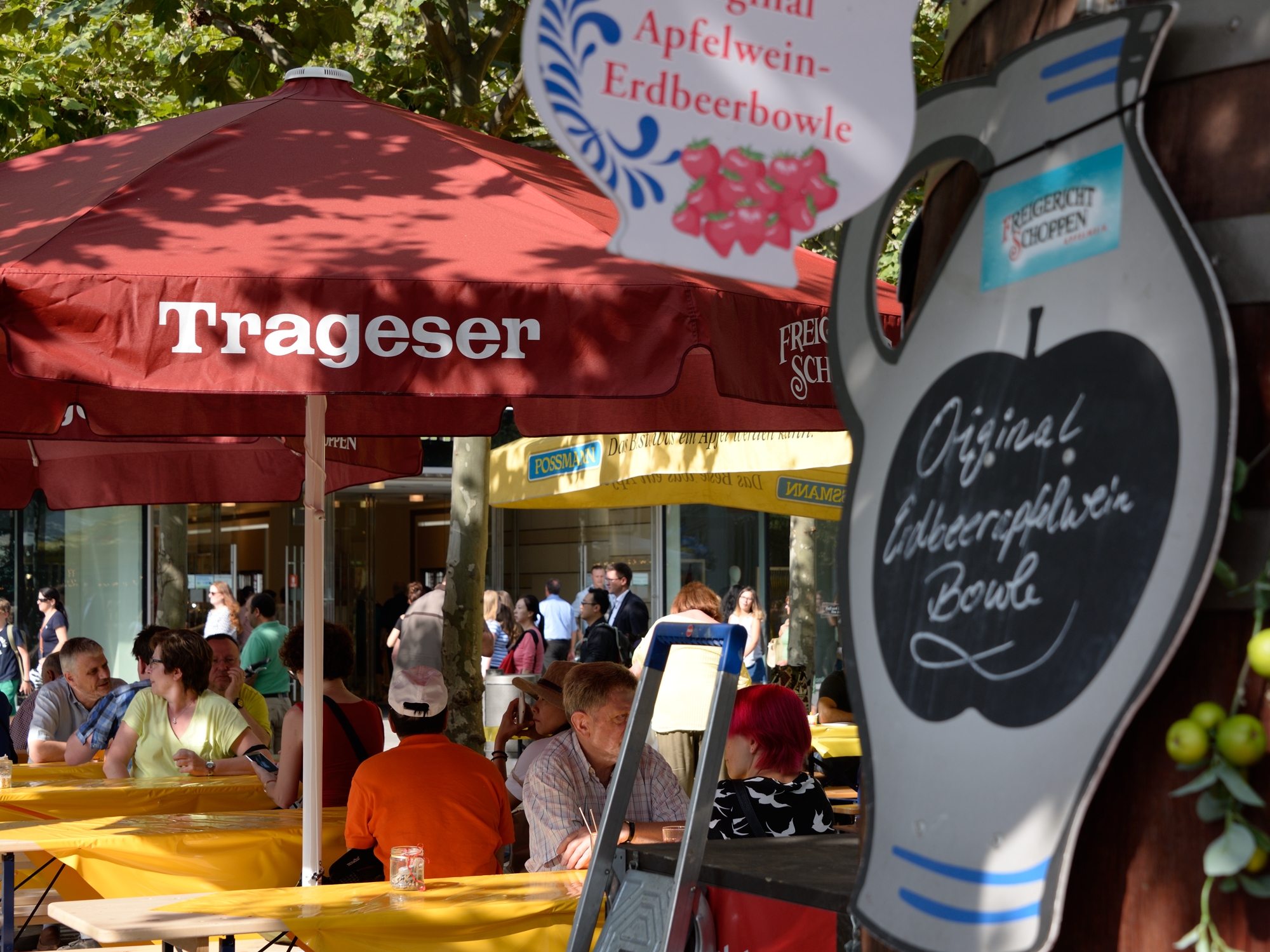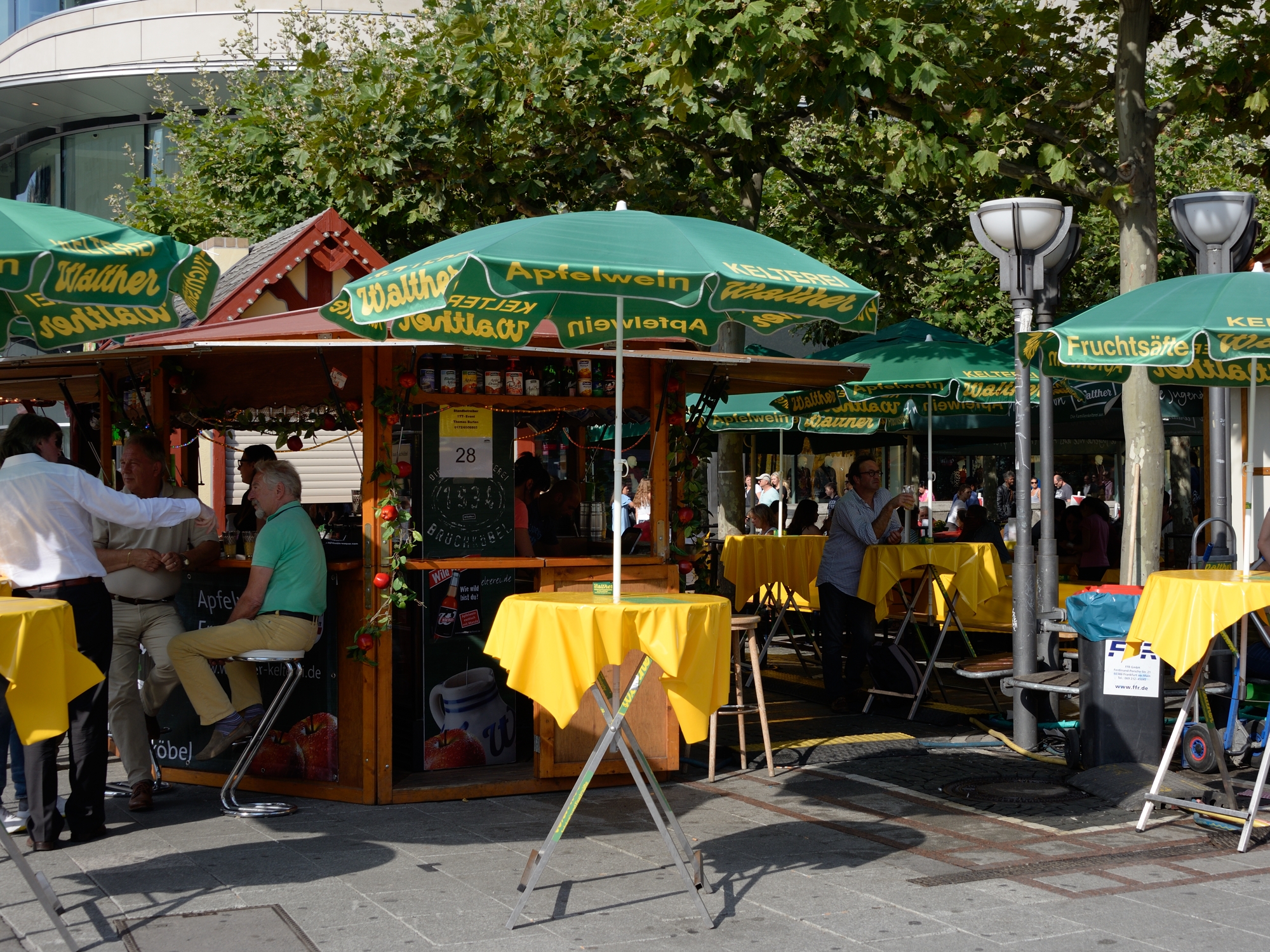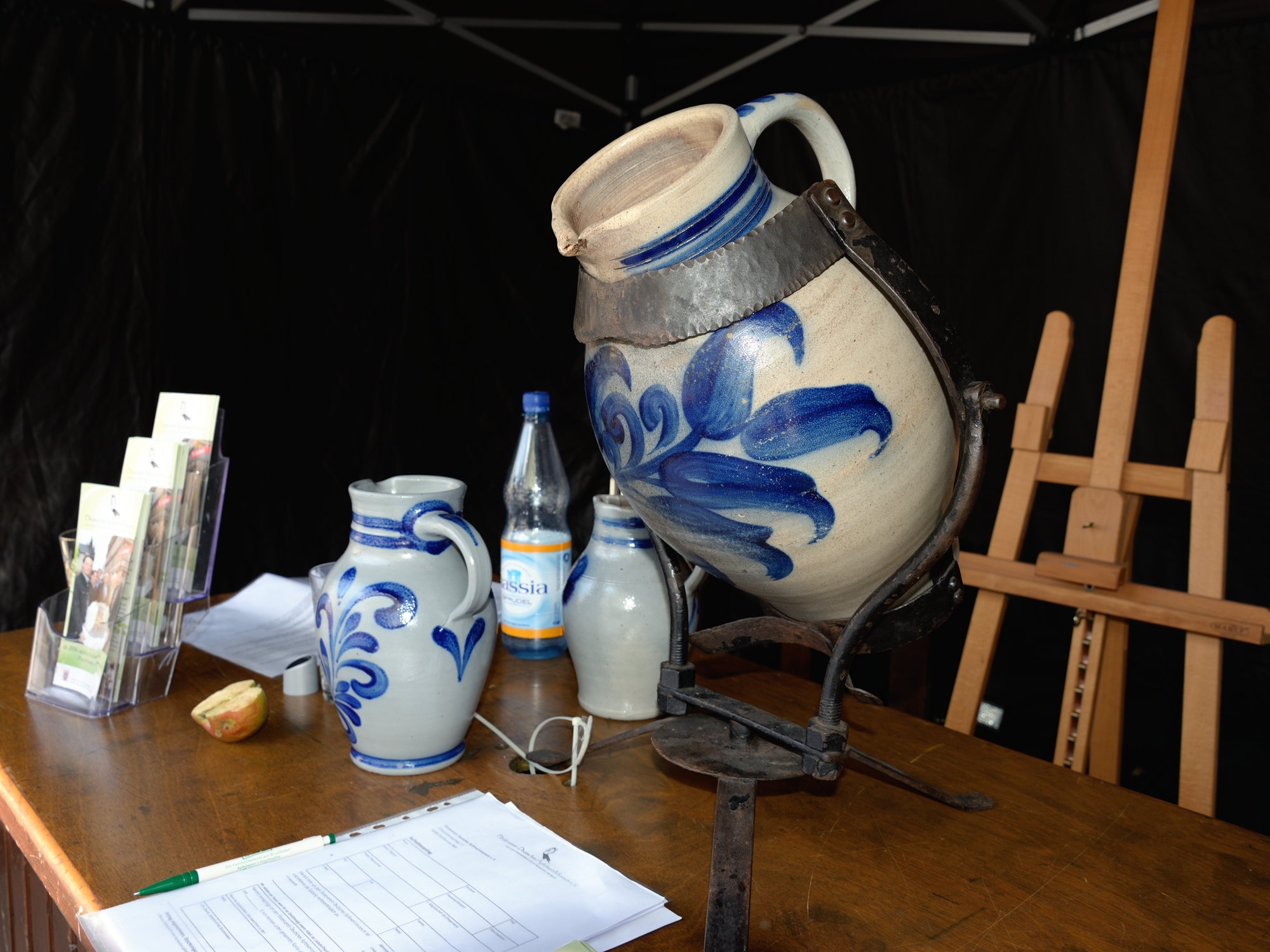Federweisser - a special wine available after the grape harvest
What is Federweisser?
Federweisser suddenly appears at the end of September in towns and cities within the German wine regions. Some towns host a Federweisser Fest whilst in cities like Frankfurt Federweisser appears at the local farmer's markets. The season is short, so enjoy it while you can.
Federweisser is known as "new" wine. After the juice has been extracted from the harvested grapes, yeast is added to the must (juice) and fermentation begins. As fermentation progresses, the alcohol levels are monitored and once they reach 4%, the juice can be drunk in the form of Federweisser. The wine is still actively fermenting, so expect a glass of cloudy, refreshingly prickly wine which has a natural sweetness to it. The name means "feather white" and derives from the white'ish appearance of small yeast particles floating in the glass which, some say, looks like small white feathers. Don't be fooled by it's sweet taste though, Federweisser can achieve an alcohol content of up to 10%.
Federweisser - cloudy in appearance and naturally sweet
In the Rhineland you'll see Federweisser written Federweißer. In other regions it is also known as Süßer, Sauser and Neue Wein. Roterweisser is the same product but made from red grapes hence it has a deep pink appearance. Because the wine is still fermenting and releasing carbon dioxide, bottles cannot be fully sealed and are left partially open to let the gas escape. As a result transportation of Federweisser is a delicate business and this is why it is rarely available outside of the wine regions. Occasionally you can find a bottle in local supermarkets, but be warned - if the bottle is unsealed (a sign of good quality) you'll have to carry your precious cargo upright all the way home!
Traditionally Zwiebelkuchen (onion cake) is eaten with Federweisser and it's a heavenly combination. The Rhineland version of Zwiebelkuchen is a thin base of bread like dough topped with a good depth of soft, sweet onions, sautéed with speck and a sprinkling of caraway seeds. This recipe http://mybestgermanrecipes.com/german-onion-tart/ is the most authentic I have found.
Where to find Federweisser in Frankfurt
In Frankfurt the Liebfrauenberg is hosting a 10 day Federweisser Fest starting on September 27th 2024. Federweisser is also available at the Rollanderhof wine outlets at the Kleinmarkthalle, the Thursday and Saturday farmer's market on Konstablerwacher and the weekly market on Schillerstraße (details about market days can be found here). In addition, Weinschirn, Römerberg 8 (an excellent wine bar close to the cathedral), stocks Federweisser so there is plenty of opportunity to try the new wine before the season finishes!
Rollanderhof, above the back exit of the Kleinmarkthalle, serving Federweisser!
Apple wine - a speciality of Frankfurt
The 2024 Apfelweinfest is being hosted on Roßmarkt, in Frankfurt, until August 18th. If you are coming to Frankfurt then you should definitely try a glass or two of this beverage famed as the local drink of Hessen and commonly called Äppler. The name however is misleading being more like a cider than a wine with an average alcohol content of 4%. Also be aware it has a sour flavour which is why you often see the locals ordering a bottle of sparkling water, along side their bembel (jug) of apple wine, which they use to top up the drink and soften the sourness.
How to order your apple wine
When ordering by the glass, apple wine 'pur' means it is pure apple wine. If you want your glass topped with a little water, then order an apple wine 'sauer' and if you need a little sweetness, then order an apple wine 'suss', in this case the glass is topped with a little lemonade.
Bembels (jugs) of apple wine always come 'pur' and you order by the number of glasses. E.g if you are with a group of 6 friends you might order a '6er' bembel which holds six glasses of apple wine. Don't forget to order a bottle of sparkling water for those in your group who want to soften down the flavour. Better still go to Kelterei Heil, a known and respected brand in Frankfurt, and they'll include a bottle of water with your bembel.
Kelterei Heil offering a 6er Bembel and bottle of water for 12€
One joy of the Apfelweinfest is trying apple wine from a variety of producers. Each brand has it's own flavour. Some producers offer unfilterred apple wine which is cloudy and labelled 'naturtrüb' whilst the more regular applewine is clear. Two producers offering naturtrüb at this years festival are Hofmann's and Trageser. My favourite regular apple wines offering a fresh taste are by Nöll, Walther and Stier This year Nöll, Walther and Stier have their stalls side by side, so not too far to wander to sample from all three! Rosé apple wine is another variety worth a try and has a less sour taste. Nöll offer an Apfel-Secco which is milder and naturally sweet.
Apple wine is always served in a 'gerippte' glass. The pretty diamond shape etching serves a practical purpose - it's to stop the glass from slipping through your greasy fingers, which is a very likely peril after a bratwurst or two. This year the Apfelweinfest is hosting a variety of foods, including vegetarian and vegan, fish and chips, traditional green sauce and the ever present Schwenkgrill (swinging grill over an open fire) for the meat eaters.
If you've missed the festival but still want to try apple wine, try visiting one of the famous apple wine taverns in Sachsenhausen - a few of my favourites are on my web page, click on the link and scroll down to Applewine taverns in Sachsenhausen to see a list.
A traditional 'Gerippte' glass containing a sample of Hofmann's naturtrüb Äppler - Zum Wohl!
Enjoying German wines at the Rheingau Wine Festival
The Rheingau Weinfest, hosted on the Freßgass' in Frankfurt, is a great opportunity to familiarise yourself with classic German wines. Put any preconception of sweet wine out of your mind. Good German wine is a whole new World waiting to be appreciated, however the German wine classification can feel complicated to novices so, to get the most out of the wine festival, below are some hints and tips to launch you into your voyage of wine discovery.
Dry or Sweet
Trocken is the word to look for if you want a dry, crisp wine. If you find the wine too crisp and minerally you might want to try a halbtrocken or feinherb wine which contains a small amount of residual sweetness, but are not sweet wines! Lusciously sweet wines, the ones you associated with dessert wines, carry the labels Auslese, Beerenauslese, Eiswein or Trockenbeerenauslese.
Trocken and feinherb labels. Photograph © Anne Noble
Grape Varieties
The Rheingau is renown for it's riesling, the king of grape varieties. Many people underestimate riesling however Masters of Wine highly rate it for it's complexity and amazing ageing qualities. Gently sniff the bouquet of your riesling and you'll be amazed at the variety of scents ranging from floral, fruit, honey, herbs and the very distinct 'petrol' nose of an aged riesling. The Rheingau offers some other grape varieties which might be more familiar once you recognise their English names: Grauburgunder = Pinot Gris and Weissburgunder = Pinot Blanc. If you have the chance also try a Scheurebe a truely unique German grape created in 1916 by Dr. Scheu. He combined two grape varieties, riesling and bukettraube (of silvaner heritage) resulting in a wine which is dry with gentle fruit overtones.
Spätburgunder, aka Pinot Noir, dominates red wine production in the Rheingau. The style produced varies from a light finesse, which reflects the cool climes of the Rheingau area, to a richer, darker wine from grapes nurtured in the vineyards using select harvests. The difference is easy to spot in the glass, a light transparent red wine of the old style and a rich deep red of the new style.
VDP
Some producers belong to the elite VDP association. VDP (Verband deutscher Prädikatsweingüter) started in 1910 and serves to promote quality viticulture focussed on regional grape designation, quality production and vineyard management working in harmony with nature. Wine producers have to meet with strict requirements before they can carry the VDP eagle on their bottles. There are a few VDP producers at the Rheingau Weinfest. One repeat visitor is F. B Schönleber and Weingut Hamm is another renown producer which has also achieved the organic certification.
VDP Eagle. Photograph © Anne Noble
Wine Stands
This is a list of this years participants, and all offer great quality wines. All along the Freßgass will be the wine stands interspersed with food stalls making it a great place to head for an evening out with friends.

